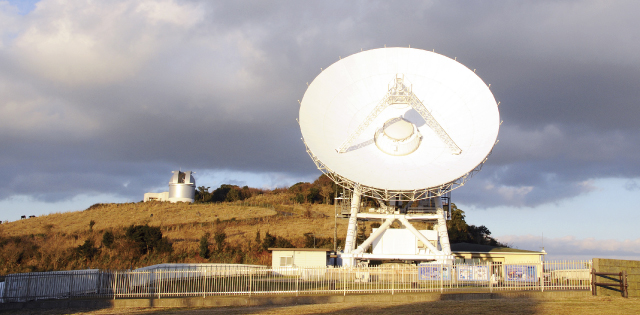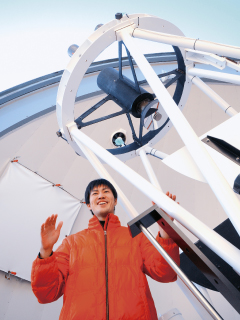
Physics and Astronomy
Physics, including astronomy, forms the foundation of science and technology that address all phenomena in the universe and that contribute all of developments in human life. It spans a wide range, from Planck-scale microcosmos of elementary particles, through the meter scale of our daily life, to the gigapasec scale of cosmology.
The Department of Physics and Astronomy is promoting researches on basic and fundamental laws of the nature, such as physical properties of matters under very low temperature or strong magnetic fields, chaotic or nonlinear dynamics, observational and numerical astronomy, and meteorology with space science. The department also aims education to train logical and practical abilities for solving complex problems, which mankind faces or which next generation needs to solve, using physical formulae.
Our department is in alliance with the JAXA (Japan Aerospace exploration Agency) and the NAOJ (National Astronomical Observatory of Japan) to forma a cooperated graduate school. We have a cooperation agreement with Ehime University to conduct joint research and education programs in both the graduate and undergraduate levels. We have also made cooperation agreements with the NAOJ, Hokkaido University, University of Tokyo, Tokyo Institute of Technology, Nagoya University, Kyoto University, and Hiroshima University for research and education in the field of infrared astronomy. These collaborations promote space researches using spacecrafts and the VERA Telescope to study the structures and characteristics of the celestial bodies in the Milky Way Galaxy.
Educational Goals (Philosophy) and Prospective Students
Our educational goal is to train researchers and technicians, who possess both deep insight in physics and flexible ability in studying natural sciences, to promote modern science and technology. We call for those who own basic academic ability, those who understand our educational goals, and those who are eager to obtain highly specialized skills through education and research.

Admission Policy
We aim to admit creative, skilled, and leading professionals via our researches such as material physics, theoretical physics, observational astronomy, and theoretical astrophysics to nurture solubility for unprecedented problems.
Prospective Students
- Those who can apply their specialized abilities and flexible thinking skills in physics to work on deepening and advancing science and technology.
- Those who can contribute to the creation of a sustainable society in the global environment.
- Those who can commit human activity in the natural world with a deep insight and a global mind.
Course Work
◎Physics Course
Education and researches focusing on deepening our understanding of electronic and magnetic properties of solids, thin films and solid surfaces by first-principle calculations, the searches for new functional materials, studies on basic chaos theory, understanding of various non-linear phenomena, investigation of characteristics in alternating fields of dielectrics, electric, magnetic, and thermodynamic research on different types of strongly correlated multilayer materials including magnetic substances such as oxide superconductors under high temperature, rare earth elements, and transition metal elements.

◎Astronomy Course
Researches on astronomy and space science. Observational and theoretical studies of the galactic dynamics and structure, Physical processes in star formation and evolution, and high-energy phenomena in the vicinity of black holes, using optical/infrared and radio telescopes. Theoretical and numerical approaches for studying galactic dynamics, cosmology, and gravity.
Curriculum
A total of 30 units or more must be obtained. 16 must be from required classes and more than 6 credits are needed from elective classes related to the student’s selected course. Other credits should be obtained after consultations with the student’s supervisor in accordance with a student’s research field and chosen course.
List of faculty members
The following specialists provide research and education support to students and help find solutions to student academic issues.
